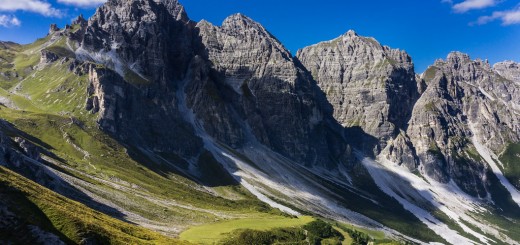To stop catastrophic climate change on Earth, Adam Frank is looking to the stars. The University of Rochester astrophysicist is the author of the recently published “Light of the Stars: Alien Worlds and the Fate of the Earth”, a book that is causing major buzz among scientists, environmentalists and others around the globe. John Dyer reports from Boston.

Image credit: Greg Rakozy via Unsplash
The book marries high science on the dangers of greenhouse gases and global warming with a study of the potential fates of other planets – like Mars, once covered in water but now presumably dry and dead – that he hopes will inspire humanity to take better care of our blue home.
“It’s like we’ve been given the keys to the planet,” he writes. “Now we’re ready to drive it off a cliff.”
Other civilizations exist in the heavens
Starting from the premise that countless planets are orbiting countless stars, Frank posits that other civilizations undoubtedly exist in the heavens.
“What were the chances that ours is the only civilization ever?” he writes. “Putting in the exoplanet data, we found the answer to be 10-22, or one in ten billion trillion.”
But humanity has yet to encounter traces of those civilizations because either researchers have studied only an iota of the potential planets that might harbour life or, more darkly, living beings elsewhere might have never advanced far enough technologically to make a mark on the universe for researchers to detect.
Scientists like Frank might someday receive a message from an extraterrestrial. New satellite technology has revealed plenty of planets around the size of Earth. Many are in the so-called “goldilocks zone” where they are close enough to a sun to receive energy and warmth but not so close or far away to burn up or freeze.
Only the hardiest can survive climate change
More pertinent for those interested in environmental innovation are Frank’s ideas on the potential fate of hypothetical otherworldly civilizations.
According to the laws of thermodynamics, any species that engaged in creating industry and energy would likely face the challenges of climate change, he writes. Like us, they would need to extract resources from their planet, convert them into other uses and deal with the byproducts from that process. Those byproducts would almost certainly alter the environment somehow. Only the hardiest, most adaptable species would be able to withstand those changes for long.
“The question is, does anybody make it?” he asked during an interview with National Public Radio. “Does anybody make it to sustainability?”
Humanity must come together
Answering his own question, Frank exhorts readers to conceive of the planet in terms of the ““astrobiology of the Anthropocene,” or the term scientists use to describe the current era of the planet where humanity dominates the entire globe.
Humans need to think of their planet as a single entity that will evolve and survive if everyone works together to maintain the fragile conditions that maintain life in general today, he writes.
That notion stems from the Gaia theory formulated by scientist and futurist James Lovelock. The Gaia theory maintains that people and the planet are evolving together, with life altering the climate and environment and vice versa in one planetary ecosystem.
Adopting a new perspective based on the Gaia theory is better than perpetuating the impasses generated by climate change deniers, activists who want to slow down progress, politicians reluctant to act and ordinary people too busy to turn their attention to potential dangers in the years ahead, Frank writes.
Extraterrestrial demise is a wake-up call
Considering humans and the Earth as a single unit in light of the probable demise of other extraterrestrial civilizations due to climate change and the likelihood that other species light years away are struggling to surviving like humanity is wake-up call, Frank writes.
After all, if people got themselves into the climate change mess, they can get themselves out of it.
“Human beings are not a virus on the planet,” writes Frank on his website. “We triggered climate change by mistake as part of our success as species. But are we smart enough now to make the right choices?”











